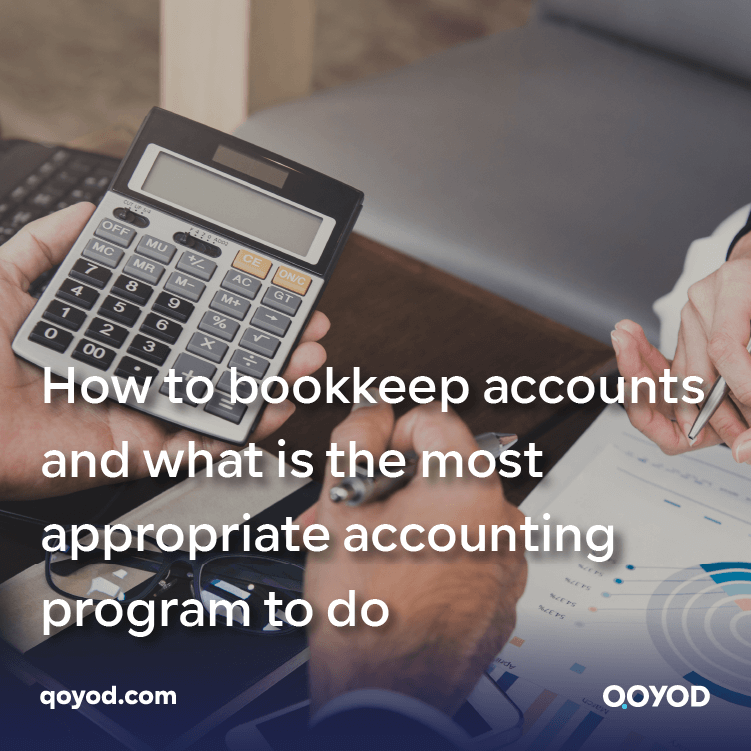In a world where technology is rapidly advanced and habits and technologies are changing exponentially, the concept of bookkeeping may seem to have become a thing of the distant past, yet did you know that it is still a key pillar of modern-day business and enterprise success? Choosing the correct accounting software may be critical to the success of your business and the attainment of your financial goals.
Imagine a moment when you are leading your own ship on a journey through the complex ocean of financial business, navigating the waves of revenue and expenses, facing the currents of taxes and financial reports, and preparing for tax storms and financial auditing. Will you have the tools to control the raging sea? Hence the necessity of bookkeeping and selecting proper accounting software.
What are the procedures for bookkeeping?
Accounting bookkeeping is described as the accurate and systematic recording of financial transactions, as well as the analysis and classification of transactions and their organization based on the quality and character of the accounts.
The significance of auditing accounts for bookkeeping
Bookkeeping is vital for operating the company and giving accurate and trustworthy financial information to make economic and financial decisions, including the following benefits:
- Preparing and structuring basic financial statements such as the balance sheet, income statement, and cash flow statement.
- Provide accurate and dependable financial information to management, shareholders, and other interested parties.
- Verifying the accuracy and appropriateness of financial transactions in compliance with established accounting rules.
- Recording and monitoring the company’s cash, bank, and investment balances.
- Report financial events and unusual transactions, and verify that they are properly documented.
- Recording and following up on banking transactions and verifying their conformity with bank book records.
- Create and execute internal control rules and processes to assure accounting compliance and decrease the risk of fraud.
- Collaborating with internal and external auditors to audit and assess financial statements.
Provide support and guidance to management on strategic decision-making and financial resource planning.
What distinguishes accounting vs. bookkeeping?
The difference between bookkeeping and accounting lies in the role they play in managing the company’s financial statements and reports.
Bookkeeping
It is part of the accounting process, and it means recording financial statements accurately and organizing them in the appropriate accounting books. The bookkeeper records financial operations, such as sales, purchases, and expenses, in addition to revenues in the books, in a systematic and organized manner. It is worth noting that the goal of bookkeeping is to maintain an accurate record of financial operations and document them.
Accounting
It is more than just recording financial statements; it’s also an analytical process that analyzes and interprets them to help management make informed decisions.
How is bookkeeping for small business owners?
When it comes to bookkeeping for small business owners, there are a number of important aspects to consider:
Keep a record of all payments.
Small business owners must keep accurate records of all payments related to their business, as manual books or electronic spreadsheets can be used to record financial transactions such as sales, purchases, and other expenses. Remember to record the full details of each transaction, including the date, amount, description, and method of payment.
Select an accounting technique.
Small business owners should determine the accounting technique that suits their business, whether it is direct accounting or more complex accounting, such as double accounting.
The method should also be compliant with local accounting requirements and help track revenues and expenses effectively.
Set deadlines
Setting deadlines is crucial for small business owners, as financial transactions must be recorded in a timely manner and arranged according to the date to facilitate the review and audit process, and it is worth noting that using a calendar or organizational program may help remind you of important deadlines.
Monitor your spending.
Small business owners must carefully manage expenses and costs, and this can be achieved by identifying basic and unnecessary expenses, closely monitoring them, following up on ongoing expenses, and reducing unnecessary costs.
All financial documents related to expenses and costs, such as invoices and receipts, must also be documented and accurately recorded in the accounting book.
Arrange your bank statements and invoices properly.
Small business owners should organize bank statements and invoices on a regular basis so that they can keep accounts, as bank statements should be reviewed regularly to verify financial transactions and the available balance and record them in the accounting book, and invoices should be organized and arranged according to date and recorded completely and accurately.
Select the appropriate accounting software.
Small business owners can take advantage of advanced accounting software to facilitate the bookkeeping process, such as Qoyod accounting software, which provides a user-friendly interface and analytical techniques to help small businesses track financial operations and generate financial reports easily.
Create recurring reports.
Small business owners should create recurring reports to evaluate their business performance and make strategic decisions based on financial statements, as these reports can include basic financial statements such as income statements, balance sheets, and cash flows.
What is the most suitable accounting software for the bookkeeping process?
Are you looking for an easy-to-use tool that saves you time and money? Or are you looking for software that is flexible and customizable to suit your unique business needs? The choice may seem difficult at first, but with Qoyod, all these difficulties fade away, as it is characterized by:
Save time
Qoyod Accounting Software is an effective way to save time spent reviewing and preparing accounting processes instead of relying on complex and costly manual labor.
The software can automate and quickly perform operations, giving accountants more time to focus on more strategic tasks.
Less human intervention.
Qoyod decreases human interference in bookkeeping, which lowers data entry mistakes and other human errors because the software functions under rigorous and preset accounting standards, improving operational accuracy and reducing the chances of errors.
Get things done quickly.
The software ensures quick completion of accounting tasks, as it allows the ability to perform operations directly and instantly without having to wait to set up entries manually.
The software can also generate detailed reports at the end of each period, making it easier to track operations and analyze financial statements.
Keeping information secure
Qoyod provides an automated program to save accounting information in the bookkeeping process in a secure and organized manner, as the data is stored in protected databases, which protects it from data loss or unauthorized access.
Data can also be backed up to ensure it is not lost.
Accurate control
Qoyod gives the user accurate control over all accounting operations, as the program can track and monitor entries and account transfers easily and validate accounting entries and records effectively, thus enhancing transparency and reducing the chances of fraud and errors.
Follow-up of financial position
The software can provide accurate monitoring of the financial position of the company or business, as the user can review profits and losses, assets, liabilities, cash balances, and a comprehensive analysis of the financial situation, thus allowing managers to make strategic decisions based on reliable and accurate financial information.
Quick and accurate checking
The Qoyod accounting program allows auditing accounts and invoices quickly and accurately, as the program can check the correctness of accounts, accounting records, and their conformity with financial documents easily and quickly, thus reducing the chances of errors or mismatches in accounts.
Conclusion
We find that bookkeeping and choosing the appropriate accounting program are crucial elements in the success of any business or institution. When you use an effective accounting period and rely on an advanced accounting program, such as the Qoyod program, you will get the accuracy and efficiency you need to control your financial affairs and make strategic decisions. Remember, the ideal accounting software is not one-size-fits-all; it depends on your individual needs and type of business. Do the necessary research and compare the available software, and choose the ones that provide you with the features and functions that suit your needs and make it easier for you to work. Get ready to enter the world of advanced accounts and choose the ideal accounting program, such as the Qoyod program, and start your journey towards financial success and business sustainability. Do not forget that the program also offers all its customers: electronic invoice systems, point of sale systems, stores, customers, etc. And so on.
After knowing what bookkeeping is and what the most appropriate accounting software is to do, try Qoyod now for free for 14 days. Whatever the size or type of your business, you will find a Qoyod program that suits your needs.
Join our inspiring community! Subscribe to our LinkedIn page and Twitter to be the first to know about the latest articles and updates. An opportunity for learning and development in the world of accounting and finance. Don’t miss out, join us today!




